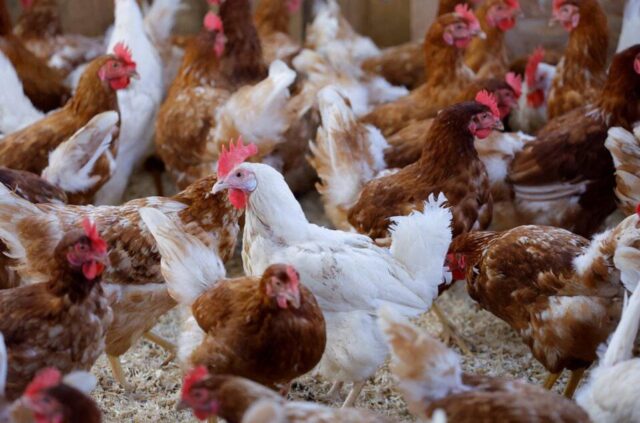South Africa’s stock of layer hens is projected to decline to an all-time low of 17.3 million birds due to the avian flu outbreak, down 23.8%, a more than 10 million flock decline from 27.6 million in 2019, as experts predict that it will take the industry at least 17 months to recover.
SOUTH Africa’s stock of layer hens is projected to decline to an all time low of 17.3 million birds due to the avian flu outbreak, down 23.8%, a more than 10 million flock decline from 27.6 million in 2019 as experts predict that it will take the industry at least 17 months to recover.
Trade and bio-health protocols, especially in the Southern African Development Countries bloc, bar vaccinations due to fears of the prevalent H796 and H5N1 avian flu strains mutating, as the virus normally does.
The Department of Agriculture, Land Reform and Rural Development (Dalrdd) and the South African Poultry Association (Sapa) told the portfolio committee on agriculture, land reform and rural development on Friday that all viruses had mutating tendencies.
The concern is that if left unchecked the virus can move from chickens to other animals, then to humans and then from human beings to other humans.
Dr Botlhe Modisane said: “The issue of vaccinations affects the future of trade. We should be careful as an industry how we handle vaccination. If we vaccinated, we would be the only country in the world to officially do so. China and Egypt are the only countries that had tried vaccination programmes, but they stopped due to the virus mutating.”
Modisane said that at a global level vaccination was agreed to as a strategy, but so far a few countries vaccinated only turkeys.
Dr Mpho Maja, a director of Animal Health, said the department was currently investigating the efficacy of certain vaccines, but so far the results of these investigations had not warranted their introduction to the market.
Maja said if a vaccine were introduced, it would have to be done in a strictly controlled manner to avoid any unintended consequences.
Maja said it was encouraging that the uptick in infection was on the decline as there had only been one or two cases in the last two weeks.
Sapa’s General Manager of Eggs Organisation, Dr Abongile Balarane, called on the department to implement various measures, including reducing the export of broiler hatching eggs, importing 53 million hatching eggs to meet the demand shortfall and relaxing grading criteria.
“It will take 17 months before the local sector recovers from its lost production. As a result, Namibia is an alternative for South Africa’s table eggs,“ he said.
Balerane recommended that affected farmers received adequate compensation so that they could ramp up egg production once the outbreak had passed.
Sapa is concerned about the industry not being compensated for the birds culled, with Sapa CEO Izaak Breytenbach telling Parliament that more than 13 million birds had so far been culled due to the avian influenza: 2.5 million in 2017, 3 million in 2021 and 7.5 million so far this year.
In the current outbreak, 2.5 million broiler breeders out of an 8.7 million population had been culled, said Breytenbach.
He said the broiler industry was in distress – a situation that was compounded by load shedding, interrupted water supply, infrastructure failures and high feed costs. He called for the strict implementation and monitoring of bio-security measures as a substitute to culling.
“The lack of compensation leads to farmers refusing to cull their birds, leaving a longer term and higher risk of contamination. The farmers refuse to cull because they cannot afford to. There is no insurance company that will cover avian influenza because it is high risk. Compensation is to give the farmers an incentive to cull stock because they are losing their livelihoods,“ Breytenbach said.
He said though total estimates of the impact had not been concluded, the industry in 2017 lost R1.8 billion in revenue in what was a minor incident compared to the current outbreak, which would go beyond R1.8bn.
The Deputy Director-General at the Dalrdd, Dipepeneneng Serage, said even were the government willing to compensate for culling, statutes placed the onus of bio-security on the farmers and also made it a prosecutable offence to conceal information on disease outbreaks.
Serage ruled out the government being obliged to compensate farmers for culled stock, pointing out that farmers who had previously taken the government to court over compensation had again seen re-infection at their farms, reflecting poor standards of bio-security measures.
“The transfer of chickens from the North West to the Western Cape in George was a very reckless move by the farmers concerned. We are finalising regulations to control the movement of chickens around the country now. No chicken must move around without authorisation,” Serage said.
Gauteng, with 95% of its layer stock, is the most affected region in the country, leading to a shortage that has to be plugged with egg imports from Namibia as well as liquid and egg concentrates.
Meanwhile, Xinhua reports that Mozambican authorities have ordered the slaughter of more than 45,000 hens infected with bird flu in Morrumbene in the country’s southern Inhambane province.
National Director of Livestock Development Americo da Conceicao was quoted as saying that the chickens were infected by avian influenza that broke out in neighbouring South Africa.
– BUSINESS REPORT








